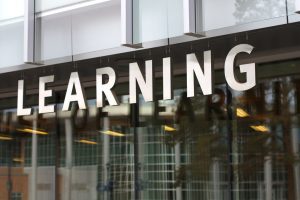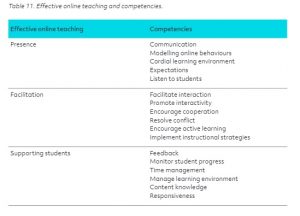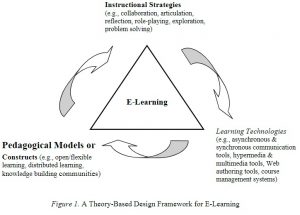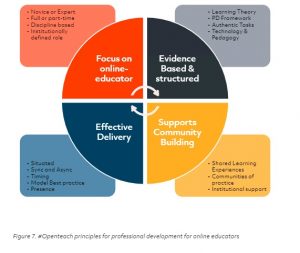
“Learning is Hanging Out” by cogdogblog is licensed under CC BY 2.0
This week’s readings are about open educational practices and learning design for online education. I have used a ‘What?-So What?-Now What?’ critical reflection framework to guide my thinking on the topic based on the assigned readings, annotations on those readings, and class discussion.
What?
When it comes to educational philosophies, there are many theories that help teachers determine their thoughts and beliefs about students needs, abilities, and the way they learn best. These approaches have always been discussed in terms of traditional classroom teaching. However, as times are changing, it is important to review pedagogical approaches and schools of thought when planning and teaching in a digital world.
To teach online you have to have the same skills as a classroom teacher – it is the same. This comment riled up the conversation in our large group discussion like never before. Initially I had the same perspective and thought that a good online educator had to have the same skills as a classroom teacher. However, through conversation, I learned that it takes those skills and more. Leanne and some of her other U-Connect colleagues shared that there is so much that they have to think about as online educators that classroom teachers just intuitively do when face-to-face with students (e.g. formative assessment, classroom management, time spent on task, access to technology, testing, pacing, and accessibility of units of study.
The role of an online educator is changing and it has now become a facilitator, content expert, manager, pedagogical expert, socialite, technical guru, and quality assesor (Shé Ní, Farrell, Brunton, Costello, Donlon, Trevaskis, & Eccles, 2019). Shé Ní et al. (2019) completed research that clearly noted the competencies that characterize effective online teaching. See chart below.

Conole et al. (2004) thoughtfully mapped out key learning theories, their main characteristics, and how they might be effective in the context of online learning. Two of the most interesting approaches were activity-based and experiential learning. Activity-based theory is a recent realization that the development of content alone does not lead to more effective learning and that there is a need to structure and foster learning environments to enable communities to develop. By using the web as a networking tool, learners have more diverse access to different forms of expertise, experiences, and collaborative groups. An experiential learning approach in online education could be the use asynchronous communication. This offers a new form of discourse which is not bound by time, allows opportunities for people in a variety of places equal access, and offers increased opportunity for reflective thought before participation.
However, over the past ten years, researchers have found a lack of application of models and theories by educators in the field of online learning (Conole et al., 2004). They speculate that is due to overwhelming array of perspectives. Which I totally agree with. Even through my experience in my undergrad education courses, there were so many different philosophies and approaches to teaching and learning. And we just noted which ones were similar to our own beliefs of children. But on a day to day level, it is not something that I think about and/or reference when planning my teaching. So I can understand how it would be the same for teachers teaching online.
But I also understand the importance of understanding and applying a few of the approaches in an online teaching environment because there is often a lack of structure everywhere else (e.g. communication, grading, communication, etc.). Through the research, it has been found that toolkits are and effective way of having teachers consider and plan with theoretical concerns in mind.
“By mapping and aligning learning theories, it will be possible to outline the features of theories in a way that scaffolds users’ engagement with these ideas; in addition, representation of this process using the model provides an opportunity to make the relationship between theory and practice more explicit” (Conole et al., 2004, p. 22).
Another approach to designing programs for online learning is presented by Dabbagh in 2005. She presents a theory-based design framework for e-learning that focuses on the interaction between pedagogical models, instructional strategies, and learning technologies (Dabbagh, 2005).

This frameworks reminds me of the TPACK framework that is released in 2006 by Mishra and Koehler. Both models take into account the physical technology, instructional strategies, and peoples personal pedagogical constructs in order to build effective and sustainable practices.
Learning design has also emerged in the last 20 years as a new methodology to help educators make more pedagogically informed design decisions that make appropriate use of digital technologies. There are a variety of learning theories that can be used to promote different pedagogical approaches. Each emphasize different ways to foster communication, collaboration, and reflection as well as different types of blended learning approaches (e.g. experiential learning, embodied learning, multiliteracies, and gamification) (Conole, 2018). Digital technologies can be used to implement these approaches, however they require new approaches to design. Learning Activity Management Systems (LAMS) and Learning Management Systems (LMS) are tools for designing, managing, and delivering online learning activities and content.
So What?
My number one question that comes out of these readings is – what does mapping pedagogy for e-learning look like in elementary schools? I would assume that at a district level, the superintendents reflect on their personal pedagogical approaches to teaching and learning as well as research based on what is best for children. And then based on their (and their team’s values) they push out information and opportunities to their employees. However, I have a harder time when it comes to individual schools. Each educator is going to have a different pedagogical approach. I have been thinking about different frameworks to share and discuss pedagogical approaches with our school staff in order to develop a school-wide technology plan. And I think that by discussing pedagogical approaches, it will ensure for more buy in, and therefore, a more sustainable plan.
Through readings and class discussions, we have come to the agreement that teaching online is, in fact, different than classroom teaching. However, why are we not educating our online teachers in a different way? The U-Connect teachers have had the same education that classroom teachers have had. And the only additional training they have received on LMS’s has been through their own district or school-based professional development. Who is teaching these new approaches to design? Is it part of the undergrad programs within the education department now? And how are we teaching teachers that are already in the field? These are all questions that I still have around online education. If we want the community to see it as a valid alternative to a classroom environment, then we need to ensure that teachers feel competent and confident. And this means putting the time and money into changing some post secondary programs to include more education on e-learning. The community will buy in when they see the the movement is supported by the education system as a whole.
Shé Ní et al. (2019) has provided a framework that notes the most effective way of delivering professional development to online educators. See graphic below.

Another conversation that came up in class discussion was on the topic of Learning Management Systems (LMS’s). LMS’s are platforms that are used by teachers to organize, manage, and share content for online courses. There are only a few out there that are widely used by educational institutions (e.g. Blackboard, Moodle, etc.). They seem pretty static and have been relatively unchanged over the past five years. Some questions that came up and do not really have a definite answer are:
- Who is providing input on LMS? Are we getting parent/student feedback in order to update systems?
- How often are systems updated to integrate new technology?
- How are LMS’s using artificial intelligence to support students and provide more detailed information to teachers teaching online? (e.g. tracking eye movements, etc.)
Now What?
Now, how does this affect me? I am a grade two teacher and Vice-Principal at my school site. Throughout these readings, I thought about how I, as a leader, could start mapping out a technology plan using a pedagogical framework as support. I hope to start by having a conversation based on the ISTE standards and which ones they agree that they are doing well and which ones are important and need more time being spent on it. I am hoping that that will start to give me an idea where peoples pedagogical approaches are within the context of educational technology.
References:
Conole, G., Dyke, M., Oliver, M., & Seale, J. (2004). Mapping pedagogy and tools for effective learning design. Computers & Education, 43(1–2), 17–33. http://ezproxy.library.uvic.ca/login?url=https://doi.org/10.1016/j.compedu.2003.12.018
Conole, G. (2018). Learning Design and Open Education. International Journal of Open Educational Resources. Retrieved from https://www.ijoer.org/learning-design-and-open-education_doi-10-18278-ijoer-1-1-6/
Dabbagh, N. (2005). Pedagogical Models for E-Learning: A Theory-Based Design Framework. International Journal of Technology in Teaching and Learning, 1(1), 25–44. http://ezproxy.library.uvic.ca/login?url=http://citeseerx.ist.psu.edu/viewdoc/download?doi=10.1.1.475.4593&rep=rep1&type=pdf
Mishra, P. & Koehler, M.J. (2006). Technological Content Knowledge: A Framework for Teacher Knowledge. Teachers College Record, 108 (6), 1017-1054. http://citeseerx.ist.psu.edu/viewdoc/download?doi=10.1.1.523.3855&rep=rep1&type=pdf
Shé Ní, C., Farrell, O., Brunton, J., Costello, E., Donlon, E., Trevaskis, S., & Eccles, S. (2019). Teaching online is different: Critical perspectives from the literature. Retrieved from Dublin City University website: https://openteach.ie/wp-content/uploads/2019/11/Teaching-online-is-different.pdf
Recent Comments